Below is the complete text of a reportage from the Immortal Regiment in Frankfurt-am-Main:
The “Immortal Regiment” broke through the prohibitions in Germany
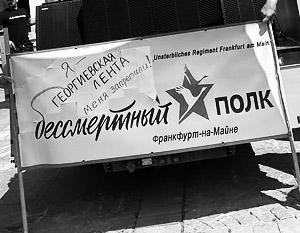
(The white taped-over field in the upper left corner carries the text: “I am the St.George ribbon. I’ve been forbidden.”)
The marches of the “Immortal Regiment” took place all over Europe, but especially vividly in Germany
May 9, 2022, 16:20
Photo & text: Marina Khakimova-Gatzemayer
Frankfurt-am-Main
“I am an American. I go to your Russian rallies.” This unexpected meeting took place in Germany, where the Russian residents of this country held one of the numerous marches of the “Immortal Regiment” around the world. One of the participants of the action, a correspondent of the newspaper VZGLYAD, described her emotional impressions of what was happening.
– Last year there were so few of us at the march of the “Immortal Regiment” in Frankfurt that I had to carry the portrait of my grandfather in one hand and the shaft of our banner in the other. There was no one to take it. And now, look how many of us there are! – my friend Galya tells me, happily looking around at the people gathered at the Frankfurt “Immortal Regiment”. We have become friends with Galya in recent months – at rallies and demonstrations that the Russian-speaking population of Germany holds almost every week.
May 8 in Germany is officially the day of the end of the war. May 9 is a normal working day on which processions are prohibited. So our patriots had to celebrate the Victory over fascism on the eighth. Frankfurt is flooded with sunshine and packed with Ukrainian flags, pro-Ukrainian posters, portraits of Zelensky with the face of a martyr, anti-Russian street installations. We are already used to feeling like outcasts here.
They were preparing for the march for a month, texting, calling up, sharing news: “The government will ban the Immortal Regiment,” “No, it will only ban the Victory Banner,” “Military songs, anthems, marches are prohibited. Will we sing ditties about Hitler?”, “We were allowed only flowers and portraits of veterans, but the shaft on the portrait should not be more than a meter!”, “Maybe we should dress in the colour of the St. George ribbon?”, “In German social networks they write that everyone who comes to the “Immortal Regiment” will be evicted from Germany by force”, “Take your passports with you, everyone who celebrates Victory Day will be checked for German citizenship!”, “Where to buy a Russian banner?”
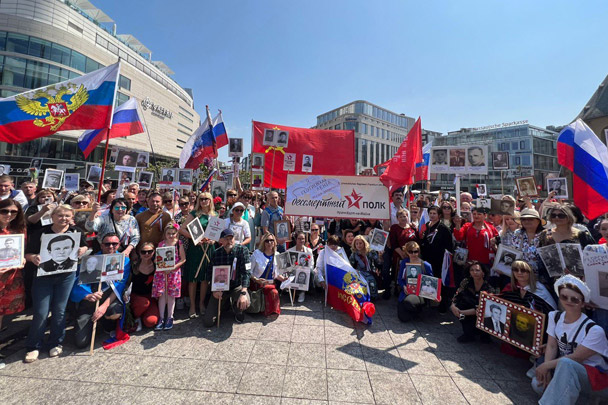
The day before the march, its organizers across Germany finally announced on social networks: “Hurrah! We were allowed to celebrate on May 9th! But St. George’s ribbons are prohibited in all forms, if they are decorating the portrait of a veteran, you need to paint or tape over it. Banners are banned in Berlin. In other cities, the police is deciding at the last moment. Any military symbols (caps, tunics, badges, the letters Z and V) are prohibited.” The list of prohibitions is a page long.
“I’m afraid. I won’t go to the Immortal Regiment. I have children,” one friend wrote to me. “COVID. I’m afraid to get infected in the crowd,” an old friend signed off. But there are a minority of such people. Despite the threats, according to the official German press, more than a thousand people gathered for the march in Frankfurt alone.
The rally that precedes the march is opened by an elderly professor of the Goethe University. German anti-fascist. Approaching the microphone, looking around our huge crowd, he speaks in German:
– I have been studying the history of the War for more than 50 years. I will tell you about the crimes of fascists throughout Europe…
He lists the facts: capitulations of all European countries one after another in the early forties, Auschwitz, Buchenwald. The offensive of the fascists. Brest. Kiev. Minsk. Leningrad. The number of victims. The exploits of the Soviet Army. Stalingrad. The red banner over the Reichstag. 27 million Soviet citizens are victims of fascism. And in the end – the wars that NATO has unleashed in the last 70 years. Vietnam. Syria. Afghanistan. Serbia… The last on the list were the crimes of the alliance in the Donbass.
A young, beautiful Chilean woman replaces the German scientist, tells into the microphone that she owes her life to the Russians, her parents are Chilean revolutionaries, Russia saved them. Lists US crimes in South America. At this time, a crowd with Ukrainian flags appears nearby. Ukrainians and Germans supporting them shout obscenities at us through the loudspeaker. We pretend not to hear them. The Chilean woman tries to shout over them.
Her little daughter runs up to her, sits at her mother’s feet.
Our women start singing “Katyusha”, then “Cranes”. Our teenagers are handing out printed lyrics, red ribbons, white ribbons that say “St. George’s ribbon, banned in Germany.”
– Now we will go to the Roman Square! Please do not give in to the provocations,” one of the organizers of the march asks, recalling that at our last demonstration against Russophobia, a young Palestinian was arrested for an anti–fascist poster in German. The Palestinian has not been released for the third week.
A long column – a thousand Russian patriots with portraits of veterans – we are walking through Frankfurt. To the sounds of “Victory Day”, “Cuckoo”, “For life”… And suddenly – rap in German. I listen to the text. The verses are alternating in German and Russian. These are German rappers, descendants of immigrants from Russia, members of the anti–fascist group Ginex, who especially for people like us wrote the song “Zeig deine Flagge!” – “Show your banner!”
What is the difference, tell me, between you and me?
We will both stand up for our relatives, like a mountain…
We, our children, fate has tested us for strength,
We didn’t want to, but we had to show our power.
First immigration, then integration,
It was hard and I had to fight often,
There are sidelong glances around, fire and ashes around,
Are you German or Russian,
Are you Turk or Kurd,
Show me your banner!In my Germany, it doesn’t matter who you are by nation,
I’ll tell my son to respect the traditions,
I don’t want him to run away from the police,
We are not the enemy, but racism is,
Don’t be shy about your culture, show your banner!
Policemen, armed to the teeth, wearing masks, walking in a tight formation parallel to our march, look at each other in surprise. I see one of them taking off his mask, greedily catching fresh air.
– This is my grandfather, he died here on German soil, – says a man says to the policeman in good German, showing a portrait of a veteran. The policeman turns away. He is forbidden to talk to our people.
German journalists are looking at us in fright. They never approach ours with questions. They only shoot videos and take pictures.
We are Russians, Belarusians, Serbs, Jews, Palestinians, Syrians, I see several strong men in trousers with red stripes and hats – Cossacks, several black youths. They don’t know the words of our songs, but when “Darkie” sounded, they dance along with our women, just as if it’s their native song. A lady in a red hat, in a red long dress comes up to me!
– Marina, I recognized you! – Lana and I have been corresponding on social networks for several months, sharing reports on the fighting in Ukraine. We are hugging as if we know each other since childhood. – Look! I outwitted the fascists! I am with a St. George ribbon! – proudly she shows me the ribbon attached to the chain from the cross, so that it could not be seen from a distance. – Our people don’t perish in any circumstance!
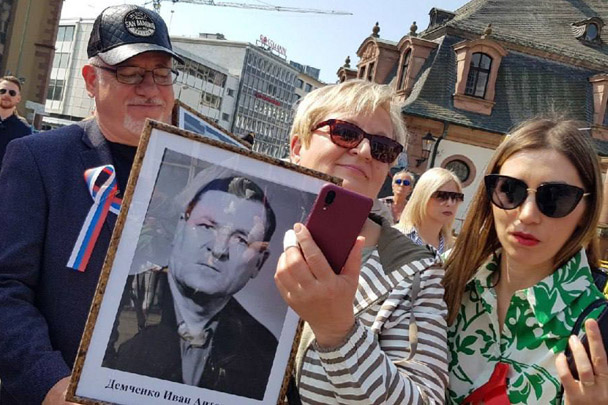
Why have Russians, Russian-speakers and everyone who does not want to fit into the Russophobic mainstream in Europe become so active recently? United, remembering the history of the USSR. Why do those who left our country 30, 20, 10 years ago look at Russia and our military with such fervent hope today?
One of the main reasons is that now, for the first time in so many years, the Germans have dropped their hypocritical, friendly, sugary masks and shown their true face. Now we, living in NATO Europe, see this face disfigured by hatred and thirst for blood every day. We realised this earlier than many in Russia: our words about friendship, peace, truth, justice, examples from history do not mean anything for the Europeans now. As it was almost a century ago, the descendants of the fascists are afraid of us and cannot stand our sincerity, inner freedom and spiritual strength on the physical level. Our fearlessness.
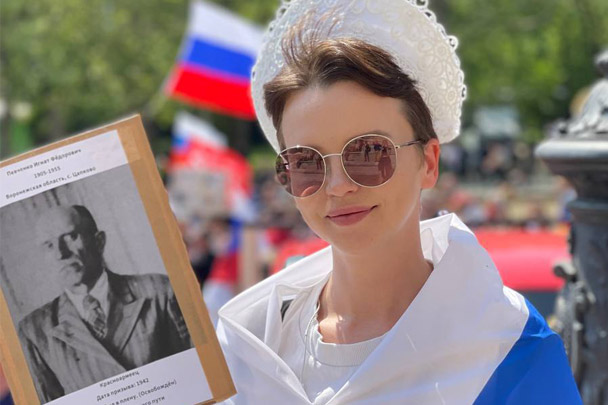
“Russians! Get out of Germany!” the Germans, wrapped in Ukrainian flags, shout. “Putinistka! Get out of here!” – they run after us, yelling, waving yellow-blue posters “NoWar!” “Go to Russia, to your Putin!” – a man shouts, leaning out of the window of the building, past which our column passes. Smiling, we sing our military songs. And I feel like right now our veterans, our whole history, our music and our poetry are fighting Nazism in our ranks.
The “Immortal Regiment” in Frankfurt stops on the central Roman square. We sing the anthem of Russia. At the previous demonstrations against Russophobia, everyone had already learnt it by heart.
Next to me is a tall man of European appearance.
“Is this woman a relative of yours?” He asks me in German, pointing to the portrait I’m holding in my hand.
“This is a photo of my favourite poetess Olga Fyodorovna Bergholz, – I answer him, and quickly tell him about the voice of besieged Leningrad. – Her daughter died. And there are no direct descendants left. Therefore, today I decided to carry her portrait on German soil.
“My name is Thomas Ewald Wehner,” a man suddenly introduces himself and holds out his hand to me. “I’m an American. I go to your Russian rallies. And tomorrow, May 9, on your Victory Day, I will go to the cemetery, put flowers on the grave of the Soviet soldiers. I postponed all the affairs of my company specifically for this purpose. I am the chief of a tax office.”
Seeing my surprise, he explains. His father was among those American soldiers who entered Germany after the war. There are still many of their military bases here. His mother is German. Thomas willingly talks about himself:
“I don’t believe German and American propaganda. I don’t believe Scholz and Zelensky. While it was allowed, I read and listened to “Russia Today”. And now I’m reading pro-Russian banned media.
He lists dozens of German blogs and Telegram channels, names German journalists who, as he says, “write truthfully because they went to Donbass themselves.”
“If you turn on German official television, then from morning to evening you will see only tearful Ukrainian women, grandmothers and children there. Crying children – it really hits the nerves,” says Thomas. “But there are wounded crying children in Donbass, too! There are murdered children! They are never shown to the Germans!”
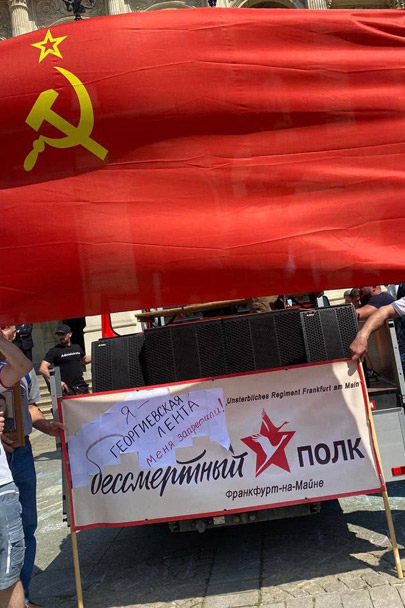
“Can I take a picture of you?” I ask timidly, knowing that everyone who adheres to pro-Russian views is being persecuted in Germany now, and even some Russians who go to the demonstrations against Russophobia ask not to publish their photos on the Internet.
“Please take a picture of me,” Thomas says proudly. “And tell the readers in Russia about people like me.”
“There have always been people among the Germans and even the Americans, who have not allowed themselves to be deceived. You Russians should know that even now not all of Europe is against you. I am against NATO.”
After saying goodbye to him, I slowly walk to the underground parking lot. A lump in my throat. At the parking machine, nervous, I stop. Some kind of new payment system. A queue is forming behind me.
“Can I help you?” I hear English speech nearby. I turn around and see a young woman with a child. “Do you speak Russian?” she asks, realizing that I am Russian, “I myself could not figure out this German unit for a long time.”
We’re paying off. Walking to our cars. The woman looks at the portrait of Olga Bergholz in my hands and a ribbon with a tricolor on my jacket.
There is an unspoken silence hanging between us. It’s easy to yell at Russians when you’re in a crowd, but when we accidentally meet one on one, we look into each other’s blue eyes, we are silent. She has a baby in her arms. I have a portrait of Olga Bergholz in my hand.
A large Turkish cheerful family passes by us, a German couple swears among themselves, some other people speaking other languages. And we, a Russian and a Ukrainian, both speaking the same language, are stuck in this polyphonic Frankfurt vis a vis each other.
When we walked with the portraits of veterans to the sounds of Soviet songs past Ukrainians shouting curses at us in Russian, our women waved their hands, smiled and shouted:
“Stop hating us already! Come to us! We are one people! We are all good!”
It’s only at first unbearably painful to smile at someone who hates you. And then you get the urge to hug these poor angry people. They scream, jump, lie in red-stained sheets on German squares, they howl infernally, calling on all Europeans to rally against the Russians. Poor little girls who have forgotten their history. They are afraid to talk to Russians because they are afraid of the truth. And the truth, no matter how much they now rely on NATO weapons, will definitely win.
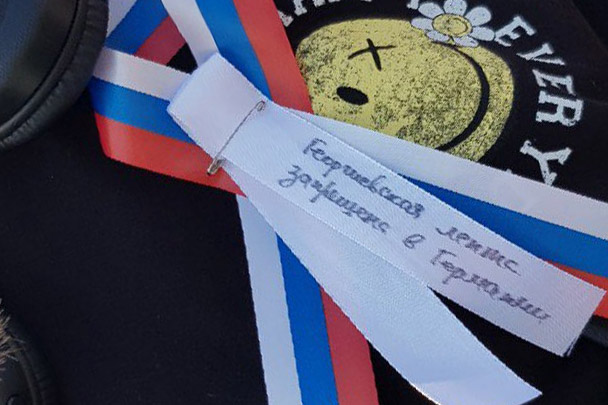
“St. George ribbon, forbidden in Germany” written on the white ribbon.
Olga Bergholz’s poems helped the blockaders to survive. Now the poems of the poets of the Great Patriotic War, the poems of modern Donbass poets, our military songs of different years sound like prayers. “Victory Day, which began in May 1945, never ends. Like Easter, Christmas, and Trinity, Victory Day is in liturgical, not linear time, and when we celebrate it here, in the middle of May, we come into contact with God, Eternity and Russia every time,” wrote Russian writer Ekaterina Sadur, who lived in Berlin for a long time, but at the end of February this year she returned to her homeland – to Moscow.
We’re all coming back now. To God. To the homeland. To ourselves. To his unbreakable, invincible truth.
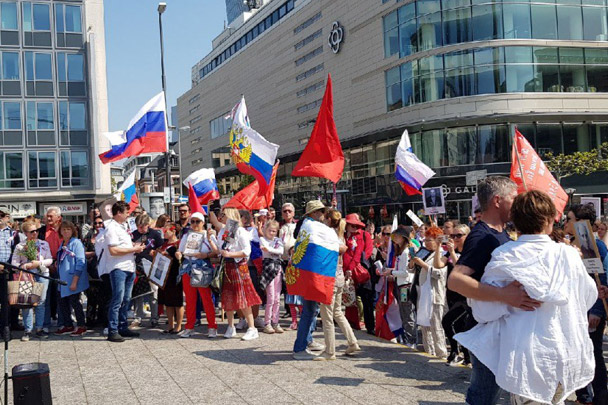
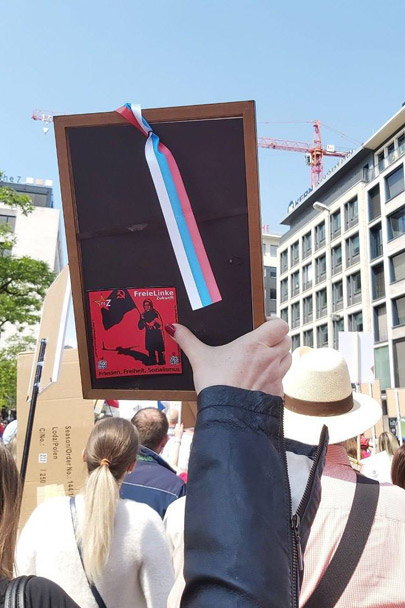
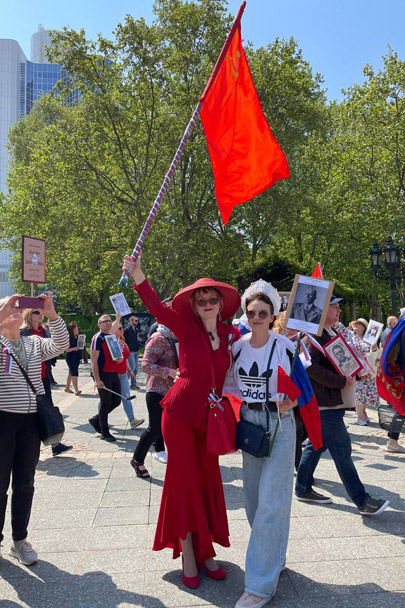

The world is waking up .Slowly but waking up .The truth will not be denied it can only be delayed .
Indeed!
Pingback: How They Broke Through Prohibitions of Everything in Germany! | Futurist Trendcast